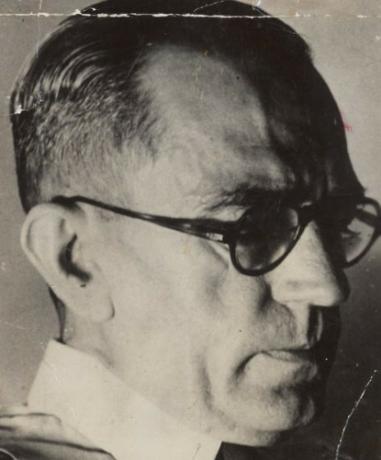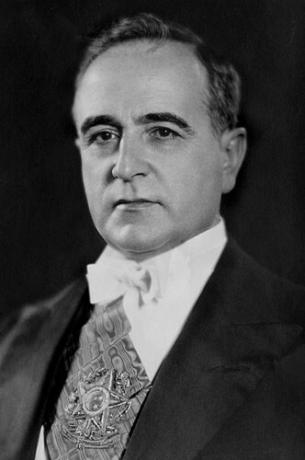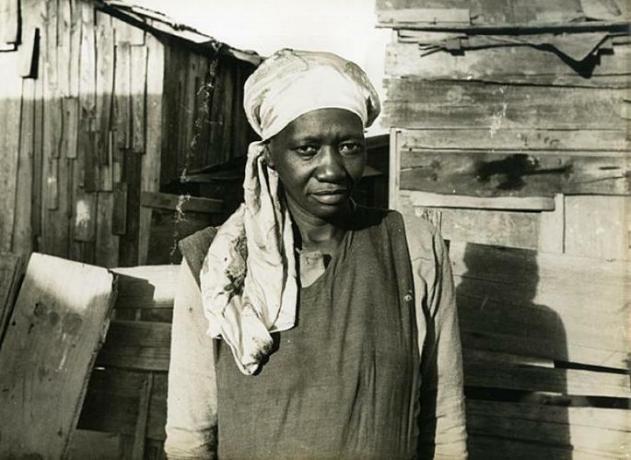Anguish, written between 1935 and 1936, was the third work published by Graciliano Ramos. At the time, the writer lived in Maceió (AL) and worked as a director at the State Public Instruction. Winner of the Lima Barreto Award (1936), he was elected one of the best Brazilian novels by great critics and writers, such as Octávio de Faria, Lúcio Cardoso, Rachel de Queiros and Jorge Amado.
Read too:Naturalism – a literary school that was taken up by Graciliano Ramos
Summary of Anguish
Narrated by Luís da Silva, a frustrated public servant and writer, Anguish is a novel characterized by self-analysis and the narrative chain centered on the protagonist's interiority.
Luís goes back to the past, seeking to re-establish the inner disarray caused by the breakup of his engagement with Marina, now committed to Julião Tavares. However, permanent dissatisfaction with the present only recovers from the past. bitter conclusions about yourself, the other characters and the world in general.
Memories of a childhood of distant affections, sexual and professional frustrations emerge in the narrative, outlining a complete lack of horizon and a
perpetual disenchantment of the character with regard to himself and the state of affairs.Luís tried professional success in Rio de Janeiro, but, faced with failure, he settled on Maceió, narrative space. He lives a small and insignificant life until he falls in love with his neighbor Marina, which brings him glimmers of satisfaction. They arrange a wedding, and Luís spends the few cents of his savings to buy the trousseau.
Do not stop now... There's more after the advertising ;)
However, his plans are frustrated when he discovers that Marina was cheating on him with Julião Tavares, a rich, euphoric, eloquent guy with literary aspirations and a constant air of superiority. O jealousy He then proceeds to take possession of Luís, who, deceived and humiliated, plunges into himself and into the disorder of defeat.
immersed in a miserable financial condition, unable to pay his own bills, surrounded by rats and the ghosts of the past, Luís finds himself unable to put Marina and Julião Tavares out of his mind. Now he followed the girl, now he followed his rival. Once, he discovered that Juliao was also involved with another woman.
Luís' obsession with memories and his distressing subjective fragmentation lead him to plot the murder of Julião Tavares. Until, in one of his pursuits, Luís finds the perfect opportunity and strangle Juliao. Overcome with euphoria and sudden happiness, he felt suddenly strong, no longer insignificant—in that moment, his sufferings vanished.
However, this lapse of joy and reconciliation with you lasts very little: quickly anguish re-installs itself in Luís, taken by the despair of being discovered. He returns home, completely disturbed, takes a bottle of cachaça and falls asleep. Does not show up for work the next day. He frees himself of the traces that would have linked him to the crime scene and lies down, sick and disturbed once more by the memories, suffocated by the anguish.
Read more: The Posthumous Memoirs of Bras Cubas – starting point of realism in Brazil
Historical context
Luís da Silva's account corresponds in time and space to the moment when Graciliano writes the novel: Maceió, after the 1930 coup. The author had completed the revision of the last manuscript version on March 3, 1936. In the afternoon of that same day, Graciliano Ramos was arrested by the army of Getulio Vargas, accused of subversion and association with communism, remaining incarcerated for almost a year.

It was a period of great economic and political turmoil. THE 1929 crisis, motivated by high financial speculation, broke the New York Stock Exchange and affected several countries in the capitalist world, including Brazil. The United States bought about 80% of the Brazilian coffee production, and, with the great economic recession, coffee, Brazil's main export, stagnated. Bag prices plummeted and farmers found themselves mired in huge losses.
O impact of economic recession he made the then president of the republic, Washington Luís, nominate for his succession the candidate, also from São Paulo, Júlio Prestes. That meant a break from the call latte policy, which alternated in the presidency of the country the members of the oligarchies of São Paulo and Minas Gerais.
Generally speaking, Brazilian governments First Republic (1889-1930) were marked by the practices of clientelism, of coronelismo, the exchange of favors and the corruption of the electoral machine to guarantee the permanence of its own interests.
It is in this scenario that groups against the candidacy of Júlio Prestes they joined together in the so-called Liberal Alliance (AL), which launched the Gaucho farmer as a candidate for the presidency. Getulio Vargas. Defeated at the polls, Vargas and his allies accused the election of fraud and launched an armed coup, ending the First Republic and establishing a new government, with socioeconomic measures that banned the coffee oligarchies of power.
Vargas ruled Brazil for 15 uninterrupted years, from 1930 to 1945, in periods that are divided into Provisional Government (1930-1934), Constitutional Government (1934-1937) and new state (1937-1945).

Several conflicts between government supporters and opponents marked the first stages of It was Vargas. One of the main opposition articulations was led by the National Liberation Alliance (ANL), headed by Luís Carlos Prestes, leader lieutenant which had the support of the Soviet Union. baptized of Communist intent, this alliance brought together a series of revolutionary uprisings between 1935 and 1936, mainly in the cities of Recife, Natal and Rio de Janeiro.
Although he had neither party association nor involvement with ANL members, Vargas's repressive apparatus considered Graciliano an ideological threat, and that was the context that led him to prison on the same day he concluded Anguish.
Anguish also mentions the another historical period, the story of the protagonist-narrator's childhood, in the mid-1900s, that is, the origin of the First Republic, in the early years of the late abolition of slavery. Luís da Silva is descendant of the large landowners who constituted a privileged caste in nineteenth-century Brazil and that they did not elaborate well on the slow transformations that were taking place in the country. Thus, the narrator's ancestry is also identified with the beginnings of the Brazilian republic and reflects the thinking of the former slavery elites:
“I walked in the courtyard, dragging a rattle, playing with an ox. My grandmother, Miss Germana, spent her days talking to herself, cursing the slaves, who didn't exist. Trajano Pereira de Aquino Cavalcante e Silva was having tremendous piles. Sometimes he would go up to the village, decomposed, in a red shirt over his lumpy cotton underwear, a uricuri hat, espadrilles and a pole. On holy days, back from the church, Mestre Domingos, who had been his slave and now had an assorted sale, he found the old man leaning on Teotoninho Sabiá's counter, drinking cachaça and playing three-sevens with the soldiers. Black was a perfectly respectable fellow. In hours of solemnity he wore a calico frock coat, a gold chain crossed from one pocket to the other of his waistcoat, and braided slippers because of the calluses, which could not support shoes. Underneath his hard hat, his reddened forehead, damp with sweat, gleamed like a mirror. Well, despite so many advantages, Mestre Domingos, when he saw my grandfather in that mess, I gave him my arm, took him home, cured his drunkenness with ammonia. Trajano Pereira de Aquino Cavalcante e Silva vomited in Mestre Domingos's frock coat and shouted:
"Black man, you don't respect your master, black man!"
(Graciliano Ramos, Anguish)
Read too: Carlos Drummond de Andrade, great poet of the Generation of 30
Analysis of the work Anguish
![Angústia was the third novel written by Graciliano Ramos. [1]](/f/4cc8c7069e58c0ece9b6b2b392da09db.jpg)
narrative focus
Anguish, the feeling that gives the work its name, is the central axis of the narrative, which guides the plot, the characters' actions and the stylistic procedure. Therefore, the narrative focus of the novel is the interior monologue: the narrator-character builds events based on their memories, on their perceptions, on the place where the distressing feeling is located.
“There are strange gaps in my memories. Insignificant things were fixed. Then an almost complete oblivion. My actions appear shuffled and faded, as if they were someone else's. I think of them with indifference. Certain acts appear inexplicable. Even people's features and the places I've passed through lose their sharpness. All that was a mess, with the idea of getting Marina back.”
It is, therefore, a first person romance, an psychological narrative characterized by a continuous state of delirium of the character: suffocated by anguish, Luís finds it difficult to differentiate the real from the unreal. He confesses that his memory is full of gaps, filled with imagination. The delusional tone drives the entire plot and erupts in the pursuit of Marina and Julião Tavares, culminating in the latter's murder.
“I remember one fact, another fact before or after the first, but the two come together. And the types I evoke have no relief. All caked, confused. Then the two events distance themselves and between them other events are born that grow until they give me a poor sense of reality. People's features sharpen. Of all that life there were vague signs in my mind. Memories that the imagination completed came out of the numbness.”
Temporality and Spatiality
Anguish it is a urban romance and its narrative space is the city of Maceio, capital of Alagoas, during the decades that followed the takeover by Getúlio Vargas. However, as the main thread of the plot is guided by the interior fragmentation of Luís, there is a overlapping spaces and time periods throughout the narrative. Ora Luís describes the present, in Maceió; now he turns to his rural past, to the countryside citadel where he grew up.
following the stream of consciousness, memories are mixed with present situations, in a constant spatiotemporal zigzag. Luís often connects Marina and Julião Tavares to events that are not directly related to them, in a distressing obsession movement, breaking the logical rigidity and expanding the sense of unreality and delirium. In the following excerpt, you can see an example of this procedure:
“The school was sad. But during lessons, standing; with arms crossed, listening to the embarrassments of master Antônio Justino, I saw, on the other side of the street, a house that always had the door wide open showing the living room, hallway and backyard full of rose bushes. Three old women who looked like ants lived there.
There were roses everywhere. The frets were covered with large red spots. While one of the ants, with her sleeves rolled up, stirred up the soil in the garden, pruned, watered, the others were busy carrying armfuls of roses.
From here you can also see some abused rose bushes in the backyard of the neighboring house. It was among these plants that, at the beginning of last year, I saw Marina for the first time, sweating, her hair on fire. There they are again shouting my wishes.”
Important to mention that the end of the book refers to its beginning, as it is after murdering Julião Tavares that Luís begins the narrative, in an attempt to recover from his awareness of his extreme and murderous action. Thus, the character finds himself locked up in a cyclical prison of his own conscience, in which nothing happens.
The romance Anguish and your time
Anguishfits in the works produced by the second Brazilian modernism. For Professor Fabio Cesar Alves, this particular work unites introspection with social criticism, typical characteristics of Generation 30. Diving into Luís da Silva's psychological situation, Anguish reveals some of the contradictions and the lack of perspective in Brazil at the time, in accelerated modernization.
The character, fragmented and deeply disenchanted with life, also shows us the the country's colonial, patriarchal and slavery roots, which appear either through the remission to Luís' past, or through the actions that are still perpetuated. Luis' drama, frustrated and stagnant in his personal life, is joined by an extraliterary drama, typical of the 1930s, when the economic stagnation slows down the modernization process.
Luís is located between the past connected to the world agrarian, in decay, and the gift connected to the world urban, expanding. The changes that come from modernization make it permanent displaced in the capital of Alagoas, where he begged until he got a job, after much suffering.
For Luís, his rival Julião Tavares represents the bourgeoisie ascendant he despises so much represents the power of money that shatters all social relationships, who buys Marina with movie tickets and silk fabrics. Luís considers bourgeois society to be largely responsible for the misery and lack of perspective in his own life:
"I can not write. Money and property, which always give me violent wishes for killing and other destruction, the two badly printed columns, frame, dr. Gouveia, Moisés, man of light, businessmen, politicians, director and secretary, everything moves in my head, like a bunch of worms, on top of something yellow, fat and soft which, if you look closely, is Julião Tavares' puffy face greatly enlarged. These shadows creep along with viscous slowness, blending together, forming a confused tangle.”
However, it is Luís himself who creates expectations of enrichment, frustrated by underpaid work, closed in constant references to lottery tickets sold by a blind person inside the office:
“-16,384, she moaned the blind man hitting the cement with his cane.
Or would it be another number. A hundred contos de reis, enough money for Marina's happiness. If I owned that, I would build a bungalow on top of the Lighthouse, a bungalow overlooking the lagoon. She would sit there, on my way back from the office, in the afternoon, as Tavares & Cia., Dr. Gouveia and the others would tell my wife stories, looking at the coconut trees, the fishermen's canoes.
- 16.384.
Dressed in pajamas, smoking, he would look down on the roofs of the city, the tiny trams running almost stopped and without noise, the spotlights of public lighting, the black coconut trees at night. Some oil paintings would decorate my room. Marina would sleep on a mattress made of paina. And when he jumped out of bed, he would step on a shag rug that would caress his bare feet.
- 16.384.
A fluffy rug, no doubt. And the bed would have an embroidered quilt covering the mattress in paina, an embroidered quilt every six months.”
Luís makes a living from writing commissioned articles on subjects he despises, but accumulates literary aspirations of writing a book and launching yourself professionally as a writer. However, before a world that crushes you, unable to place himself in any sector of society, literature for him too does not take place. This lack of identification of the subject with his work is typical of societies capitalists: cowardly in his role as a submissive journalist, he feels cornered by the power of money.
Unable to reconcile with himself, finding himself helpless in the face of a hostile reality, Luís ends up suffocated in his own inner prison and succumbing to the crime and the self destruction.
Graciliano Ramos uses the procedure of psychological narrative, at the same time that it extrapolates it, as it breaks the pure subjectivism, since the ambiance Social of the Brazilian reality makes Anguish a work that analyzes these social structures. There is a suffocating anguish of what no longer has a place, of the exhaustion of possibilities of the pre-capitalist economy, in which no economic and social renewal took place.
Image credits
[1] Editorial Record Group/Reprodução
By L. da Luiza Brandino
Literature teacher

